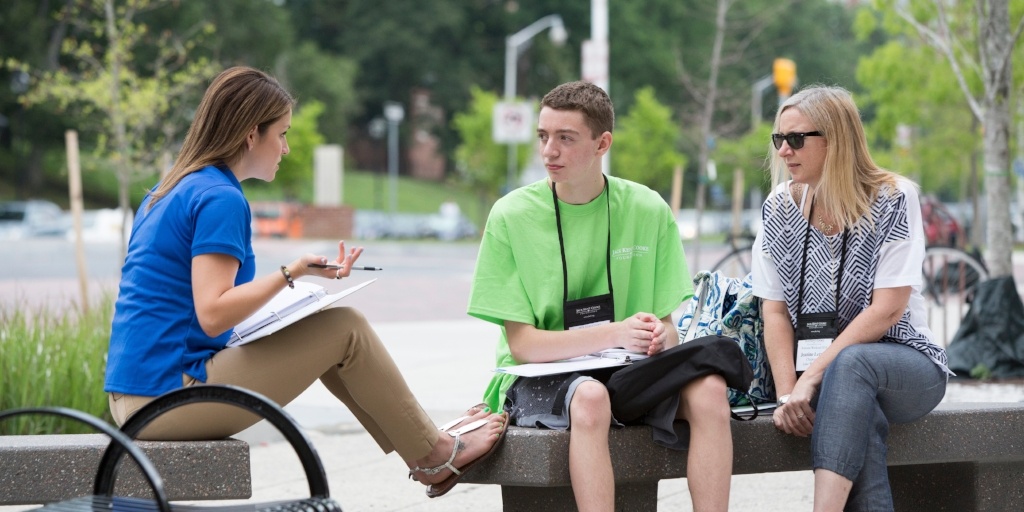New Online Advising Program Trains Counselors in College Selection

Teachers College to Pilot Online College Advising Program Designed to Train Professionals in College Selection
Funded by the Jack Kent Cooke Foundation, the new program will improve the competence of high school counselors, college advisors, teachers, librarians, school paraprofessionals, and the staff of community-based organizations to help increase college opportunities for underserved high school students
New York, NY – Teachers College,Columbia University will launch a new online continuing education programfor high school counselors, college advisors, teachers, librarians and school paraprofessionals that will provide curriculum and training in college advisement, improve the professional competence of college advisors, and increase college opportunities for low-income and other underserved high school students. The program will lead to a certificate of completion.
The program is being established as a collaboration between the Jack Kent Cooke Foundation, which is providing $100,000 in funding, and the Department of Clinical and Counseling Psychology at Teachers College. The program is based on the belief that all high school students should have strong support throughout the college search, application and selection process.
“We are starting the College Advising Continuing Education Program because strong college advising programs are critical to achieving educational equity and opportunity,” said Riddhi Sandil, an Assistant Professor of Practice in the Department of Clinical and Counseling Psychology and coordinator of the master’s in education programs in School and Mental Health Counseling, who is spearheading the program. “This program is also squarely aligned with Teachers College’s work toward achieving social justice in education and in society.”
“Too many high school counselors lack the necessary training to provide their students with the best advice in choosing the right college, gaining admission and getting financial aid,” said Cooke Foundation Executive Director Harold O. Levy. “As a result, some absolutely brilliant students who could excel at top colleges wind up attending far less challenging schools or not going to college at all. I saw this problem all too clearly when I was New York City’s schools chancellor. It has not gotten better in the intervening years.”
The Teachers College program will allow working professionals to extend their professional development, and allow working counselors and school paraprofessionals, such as librarians and coaches, to learn about best practices and strategies. Sandil and her team will develop online modules and pilot the course during the 2016-2017 academic year.
The program comes as school systems, including New York City, move to expand and strengthen college advisement programs to reach more students. It is designed to address the critical shortage of training programs for college advisors. Statistics from 2013 indicated that, of 466 masters programs in school counseling in the United States, only 42 offered an elective course in college advising, and of those only five required it for graduation.
The specialized, online curriculum in college advising will pay particular attention to the needs of high-achieving students with financial need. It is designed to increase multicultural and social justice competencies of certified school counselors and school paraprofessionals, and to promote knowledge and education about college advising to learners across the country.
The College Advising Continuing Education Program at Teachers College also will:
- Offer a specialized curriculum in college advising with an emphasis on serving high- achieving serving high- achieving students with financial need;
- Reduce the inequities in college attendance and graduation for underserved students by training culturally competent school counselors and advisors;
- Create strategic alliances and partnerships in counseling communities to enhance outreach and service delivery; and
- Build a well-trained, diverse, and vigorous workforce of school counselors and paraprofessionals who will serve as agents of change and social advocates in reducing disparities in higher education.
Need for the Program: Despite its critical importance to educational advancement and equity, college advisement is an overlooked area of school counseling. According to research from National Association for College Admission Counseling, counselors often spend as little as 38 minutes a year in providing college guidance to high school students.
The problem is particularly acute among minority and low-income students. They report feeling ill-prepared for college for reasons including lack of financial resources and academic preparation, as well as unfamiliarity with the college application and acceptance process. Research from the University of Pennsylvania suggests that, as a result, many of these students decide not to attend college, or limit their possibilities to two-year or under-resourced colleges.
The curriculum will be housed in the School Counseling program in the Department of Counseling and Clinical Psychology at Teachers College. Beyond the pilot year, the College plans to incorporate the program into a larger in-house, specialized, 12-point graduate certificate program, including a semester-long internship at a high school, targeted to current and future school counselors.
The program hopes to serve underserved high school students in “at risk” schools in the New York City and surrounding areas by implementing an annual week-long summer institute in which high school students will be selected to participate in a free, empowerment based student program at Teachers College.
Read the story online.


MEDIA CONTACTS: Gladwyn Lopez, glopez@rubenstein.com, 212-843-9231; Robin Verges, rverges@rubenstein.com, 212-843-8075; Patricia Lamiell, lamiell@tc.columbia.edu, 212-678-3979.
Founded in 1887, Teachers College, Columbia University, is the first and largest graduate school of education in the United States and is perennially ranked among the nation’s best. Through its three main areas of expertise—education, health and psychology—the College is committed to disciplinary and interdisciplinary research, the preparation of dedicated public service professionals, engagement with local, national and global communities, and informing public policy to create a smarter, healthier, and more equitable and peaceful world.www.tc.edu.
The Jack Kent Cooke Foundation is dedicated to advancing the education of exceptionally promising students who have financial need. Since 2000, the foundation has provided over $152 million in scholarships to nearly 2,200 students from 8th grade through graduate school, along with comprehensive counseling and other support services. The foundation has also awarded over $90 million in grants to organizations that serve such students. www.jkcf.org